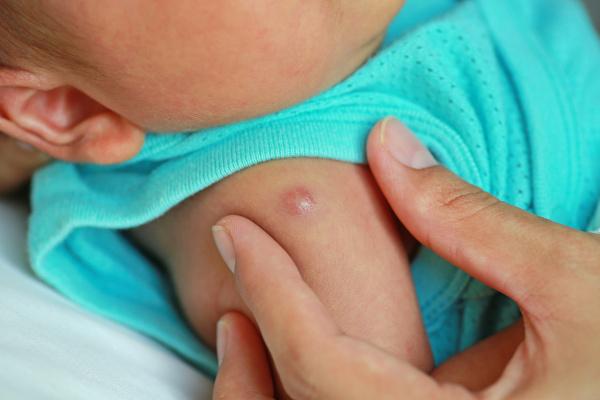THE BCG vaccine (Bacille Calmette-Guérin) is a vaccine that guarantees protection against tuberculosis, especially the more severe forms of the disease, such as tuberculous meningitis and miliary tuberculosis. BCG was developed in France, between the years 1908 and 1921, by researchers Albert Calmette (1863-1933) and Camille Guérin (1872-1961).
They created an attenuated strain of bacteriumMycobacterium bovis, known as Bacillus Calmette-Guérin (BCG), which is used in the manufacture of the vaccine, which began to be administered in 1921. Currently, the vaccine is offered free of charge at Basic Health Units.
Read more: Differences between serum and vaccine
BCG Vaccine Summary
The BCG vaccine protects against severe forms of tuberculosis.
The BCG vaccine began to be used in 1921.
Several studies have shown a very heterogeneous efficacy of the vaccine with regard to pulmonary tuberculosis.
The BCG vaccine is applied intradermally and should be administered as early as possible.
The lack of a vaccine scar does not indicate the need for revaccination.
The BCG vaccine is offered free of charge at Basic Health Units.
What is the BCG vaccine?
The BCG vaccine is used nothe prevention of tuberculosis in humans, mainly from severe forms of the disease, such as miliary tuberculosis and tuberculous meningitis. The vaccine is made using a bovine-derived bacterium similar to the bacterium that causes tuberculosis in humans.
Composition of BCG vaccine
The vaccine is produced from bacterial strains Mycobacterium bovis, which are attenuated with sodium glutamate. Although worldwide BCG vaccines use the same name, they are made up of different strains. According to the Manual of Procedures for Vaccination of the Ministry of Health, the substrain used in Brazil is Moreau-Rio de Janeiro, maintained under a seed-batch system at the Status Serum Institutde Copenhagen, in Denmark.
BCG vaccination schedule
The BCG vaccine is applied in a single dose intradermally. The vaccine must be applied early, preferably soon after birth, while still in the maternity ward. It is noteworthy that vaccination in children born weighing less than two kilos should be postponed until the child reaches this weight. Currently, the vaccine is indicated from birth to before the child completes five years old (four years, 11 months and 29 days) and for intra-household contacts of patients with leprosy.
It is noteworthy that the vaccine is contraindicated for pregnant women and immunocompromised people. In addition, it is important to postpone vaccination in hospitalized people with impaired general health.
Importance of the BCG vaccine
The BCG vaccine is important in prevention of severe forms of tuberculosis, such as miliary tuberculosis and tuberculous meningitis. With regard to pulmonary tuberculosis, studies indicate that its effectiveness is varied, ranging from 0 to 80%. This variation in protection is related to different factors, such as vaccine variability due to the use of different strains and exposure to environmental microbacteria.
Read too: Eye Tuberculosis - If Not Treated Properly, Can Lead To Blindness
Adverse Effects of BCG Vaccine
The BCG vaccine is responsible for form a typical scar at the place where it was applied.The. Initially, at the application site, an induration appears. Afterwards, the softening of the central area and the formation of a crust are observed. This crust, when falling, forms an ulcer. This ulcer heals slowly, leaving a characteristic mark of the vaccine in the area. It is worth emphasizing that it is important not to place any medication or product in the vaccine application site, since this ulcerated lesion is an expected reaction.
In addition to scar formation, the BCG vaccine can cause other adverse effects. These include fever, headache and muscle pain. Serious allergic reactions are rare after applying BCG.

Revaccination in cases of absence of a vaccine scar
For a long time, Brazil recommended revaccination in cases where the vaccine scar after BCG application did not form. However, in February 2018, the World Health Organization (WHO) published a document in which it states that it does not indicate revaccination, as the lack of scar was not a indicative of lack of protection and studies have shown little or no evidence of additional benefit from revaccination. Given this position, the Ministry of Health updated the protocol and started to recommend the non-revaccination of children who did not develop vaccine scars.
The BCG vaccine and covid-19
With the pandemic of covid-19, much has been said about the relationship between the BCG vaccine and the development of this disease. This relationship was suggested after researchers raised the hypothesis that, in countries that adopted the vaccination of BCG, the pandemic behaved differently, in addition to the fact that children are the least affected by Covid-19.
According to some researchers, the BCG vaccine provides an important immune response for children in the first decade of life, precisely the stage of life less affected by covid-19. So far, however, there is no evidence that the BCG vaccine protects against the virus causing covid-19. It is noteworthy, however, that the disease is new and many studies are underway to assess possible protection.
By Vanessa Sardinha dos Santos
Biology teacher
